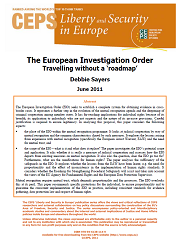The European Investigation Order. Travelling without a ‘roadmap’
The European Investigation Order. Travelling without a ‘roadmap’
Author(s): Debbie Sayers
Subject(s): Politics / Political Sciences, Politics, Law, Constitution, Jurisprudence, Criminal Law, Human Rights and Humanitarian Law, International relations/trade, Security and defense, EU-Approach / EU-Accession / EU-Development
Published by: CEPS Centre for European Policy Studies
Keywords: European Investigation Order; mutual recognition programme; European Arrest Warrant; data protection law and respect of human rights;
Summary/Abstract: The European Investigation Order (EIO) seeks to establish a complete system for obtaining evidence in crossborder cases. It represents a further step in the evolution of the mutual recognition agenda and the deepening of criminal cooperation among member states. It has far-reaching implications for individual rights because of its breadth, its application to individuals who are not suspects and the nature of its invasive provisions. Careful justification is required to ensure legitimacy. In analysing this proposal, this paper considers the following aspects:• the place of the EIO within the mutual recognition programme. It looks at judicial cooperation by way of mutual recognition and the common characteristics shared by such measures. It explores the lessons arising from experience with mutual recognition (specifically the European Arrest Warrant, EAW) and the need for mutual trust; and • the scope of the EIO – what is it and what does it replace? The paper investigates the EIO’s potential scope and application. It asks whether it is really a measure of judicial cooperation and assesses how the EIO departs from existing measures on mutual recognition. It also asks the question, does the EIO go too far? Furthermore, what are the ramifications for human rights? The paper analyses the sufficiency of the safeguards in the EIO. It explores whether the lessons from the EAW have been learnt, e.g. the need for proportionality and the effect of inconsistency in the implementation of human rights standards. It considers whether the Road map for Strengthening Procedural Safe guards will assist and takes into account the views of the EU Agency for Fundamental Rights and the European Data Protection Supervisor.
Series: CEPS Papers in LIBERTY and SECURITY in Europe
- Print-ISBN-13: 978-94-6138-114-9
- Page Count: 28
- Publication Year: 2011
- Language: English
- eBook-PDF
- Table of Content
- Introduction

